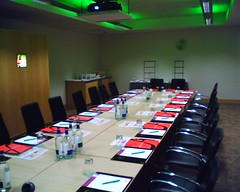Wednesday, November 29, 2006
OFCOM - most prolific regulator on the planet?
In a separate, but related development, I am very happy to have been invited to participate in a panel at an OFCOM event tomorrow, coinciding with the launch of a collection of essays, "Communications: The Next Decade," edited by Ed Richards, Robin Foster and Tom Kiedrowski. I will be joining three very distinguished speakers: Carolyn Fairbairn, Eli Noam, and Jonathan Zittrain. More on this after the event.
Tuesday, November 28, 2006
Swedes at Christmas
I'm too sexy for my blog
Monday, November 27, 2006
Elementary, my dear
Friday, November 24, 2006
Video boom in Italy
Thursday, November 23, 2006
The next generation
"The level in the network where regulatory remedies may be applied to next
generation access networks may differ substantially from the current copper
local access network. Therefore, one key consideration for any next generation
access regulatory policy is the correct level in the network to mandate access
to promote downstream competition. This will, in part, depend on technology
choices made by industry. The levels may vary for different technology
deployments, but could include: access to ducts; unbundling options, including
sub-loop or fibre unbundling; or access to a wholesale bitstream product."
and
"It is not the role of the regulator to protect investments made by competitive communications providers against market risks. These risks may include the emergence of new technology developments, such as next generationUPDATE: T-Regs has some valuable additional insight on the situation in Germany.
access that superseded operators’ current market propositions. However, it is
appropriate for Ofcom to consider the interests of existing competitive
operators in ensuring the continued availability of and terms for current
wholesale inputs to their products, during the lifetime of the assets in which
they have invested. We also need to ensure that a suitable migration path for
existing infrastructure investments is allowed for following the deployment of
new technologies."
10 things right back atcha
The return of hosting
Sniffing the air
Wednesday, November 22, 2006
Pimp my 3D webcam
Slinging another award on the mantlepiece
Tuesday, November 21, 2006
Who's afraid of the big, bad wolf?
The trouble with telcos
Shameless self-promotion 3.0
Identity crisis
Friday, November 17, 2006
15 minutes of fame
Good riddance Q3
An awful lot happened in the quarter, and I won't attempt to recap it here. However, my favorite and most memorable moment was in the BT presentation, where Ben Verwaayen alluded to having been invited to visit other European carriers to discuss the process behind the creation of Openreach. Near the end of the webcast, he was asked if the other carriers had sought advice about how they could replicate the Openreach model, to which he replied whimsically something to the effect that not many had exactly shown that sort of enthusiasm.
I found this really intriguing, given comments on the issue from Ken Ducatel last month at Telco 2.0. One comment of his, which I initially refrained from including in my account of the event, was that structural separation might offer a possible remedy to the chronic underperformance of telecom in the capital markets, leading to a spate of demergers/separate listings, more transparency and a greater range of choice for investors. I sense that the carriers will naturally feel threatened by the prospect of change on this scale, but then again, if regulatory shifts and pressures from the institutions converge around this issue (as I believe they will), I assume they will learn to love it.
Weekend reading
Visual complexity
UPDATE: A Palladium class mega-uber value reader chips in with Musicovery, which is also a great idea with a really interesting UI.
Thursday, November 16, 2006
Get slung
"Just like the fixed line internet, all X-Series services will be free at the point of use, subject only to fair usage limits."
I saw a demonstration of the Sling Mobile application at Telco 2.0 last month, and it was extremely impressive. Stuart Collingwood from Sling Media, in that presentation, discussed the Viasat deal and alluded to "a couple" of carrier deals in the pipeline, so now that we have this one, I am curious as to which cellco "gets it" next. (A replay of the webcast, which I missed, is apparently going to be available in about half an hour.)
UPDATE: Even if you don't make it through the entire webcast, you should listen to CFO Frank Sixt's segment.
Consulting today

Today I have been asked to brief a media company about "convergence," or, as I prefer to think of it, chaotica. If you would like the same sort of briefing, contact me here.
UPDATE: The background on this post may be useful, because frankly, it's a bit of a weird one. The company in question is a Japanese media company which has some corporate relationships with Daiwa, I think. Anyway, they asked and I obliged. The audience wasn't necessarily well-acquainted with some of the themes I discussed, so I took along my laptop, plugged it into the projector and after my presentation, fired up some of the applications I had just talked about. We made a Skype video call with young Thomas Anglero in Oslo, started to download a Torrent file, played around with Second Life, etc. This post was made to demonstrate how to post a photo from Flickr! to the blog, update it in Blogger, and publish. The whole exercise elicited smiles of the kind I like to see - kids in a candy store.
Tuesday, November 14, 2006
Running to stay in place
A Palladium Club mega-uber value reader points me to this amazing site which converts link data from websites into a beautiful graph resembling a molecule diagram of some sort. I couldn't resist running it on this humble bloglet, and I'm amazed to see the results. Wish I had some insight into what each node in the diagram represents (maybe that's included in the upcoming premium version?).
My iPod died recently, and while I consider my next purchase, I have been consoling myself in the office by playing around with Pandora. If you haven't seen it, you should check it out, it's very impressive. Think of it as going around to a friend's house and having them play you some music they think you'd like - some you have heard, some is new and intriguing. And I like the founder Tim Westergren's style, getting out on the road in America, building awareness and also picking up some insight into the local/regional indie scene in each place. I didn't think these sorts of things happened anymore...
Apparently in response to comments I made at VON to the effect that telco video is only worth doing if it is different and relevant to the local market, a mega-uber value reader submits TV Terra, from Terra (Telefonica) in Brazil. My Portugese is not great, but it seems to be a mash-up of in-house content production and user-generated video culled from around the net (including the now-legendary Aleksey "Impossible is Nothing" Vayner), with a YouTube-like interface. Um tubo diferente, perhaps, but Terra's efforts seem to be attracting interest from mainstream advertisers, if I have gotten the gist of this segment. Perhaps telcos are getting the message afterall...
Monday, November 13, 2006
On the carousel
Meanwhile, UK cable giant NTL/Telewest/Virgin/(ITV?) was fingered by the Observer as being unable to explain what sort of performance targets underlied its Chairman's recent share windfall. I can only assume that it has nothing to do with delivering value to the end user. As a customer I've never had any trouble with NTL, though I think that may be about to change, as we have decided to dump cable in favor of Freeview. Yesterday, when I tried to call the company to ask about the procedure for changing packages (which will necessitate a move from a set-top box broadband modem to a standalone), I discovered to my shock that it would cost me 5p per minute for the pleasure, as NTL seems to have disconnected all geographic equivalents for its various "customer care" lines. Money is not the issue - I just think it's simply an outrage to charge people by the minute because they want to discuss changing their packages - what about people who want to upgrade, i.e., actually spend more money with the company? Madness, yes, but part of the overall character profile, it would seem.
Sunday, November 12, 2006
Outward mobility
UPDATE: Well, it's a well-publicized done deal now, apparently with some pretty nasty behind-the-scenes spats and subterfuge.
Friday, November 10, 2006
Sometimes it doesn't pay to be the best
UPDATE: An anonymous mega-uber value reader, who seems to be quite credible, writes in to observe, intriguingly, "Nothing in this situation is as it would seem. There is a very carefully scripted departure scenario for Mr. Baksaas which has been in place since day one. Maybe the added pressure from the government over share options accelerates the timetable a bit, but take every bit of news about this with a large grain of salt."
A day in the life of fiber
While you're at it, there are a number of other fiber themed photos in Flickr - it seems like a subject which excites people, imagine that...
Survey 2.0
Thursday, November 09, 2006
Berlin slides
Mission creep
Wednesday, November 08, 2006
Go back to the lobby...
Got my MoKo w0rKin'
Doubling up
Tuesday, November 07, 2006
Catch-up post from Berlin

Life goes on outside the Berlin ICC venue, even if what is going on inside isn't necessarily as exciting as I have found it in the past. Here's a few interesting items, by way of catching up.
Back in the UK, my cyberfreund Keith has been on a tear, revealing some interesting ingredients in Carphone Warehouse's broadband "roll-out" (single 100Mbps circuits from the exchanges? - no wonder he's getting such dismal throughput). He also has a nice piece on Sky, which matches many of my own views, which I was unable to write up due to work commitments. In particular, I agree the broadband roll-out contrast with Carphone Warehouse is pretty stark, much smaller in scope, but better in quality, with 88% unbundled - this is the difference between poorly-resourced land-grab effort and incremental service targeted at an existing adjacent user base. (Point of clarification - the numbers reported by Sky do not include the legacy Easynet/UK Online subs.)
A Palladium Club mega-uber value reader alerts me to an important announcement coming out of the Broadband Cities conference in Stockholm tomorrow. INEC is to announce an international declaration on open networks, including the following statement:
"Communities deserve to have open, high bandwidth infrastructures which are operator-neutral and able to satisfy current demand as well as meet the requirements of the future in terms of both the quantity and quality of information exchange."
Signatories to the declaration include: the municipality of Seltjarnarnes, Iceland; City of Stockholm; City of Amsterdam;, the mayor of one city involved in the UTOPIA project; Multimedia Super Corridor of Malaysia; PortoDigital of Brazil, and the City of Almere, the Netherlands. The Declaration has also been formally endorsed by the Dutch foundation 'Stedenlink' (CityLink) – directly representing 13 Dutch cities, among them: Rotterdam, The Hague, Arnhem, Enschedé and Eindhoven.
I think this is both very exciting and very significant news for anyone tracking the mounting tension between the "broadband market" and broadband as a lever of public policy. Here we have both highly-penetrated broadband markets in affluent countries, as well as initiatives in "emerging" economies, joining hands to say that what they're getting today from the market will not deliver the connectivity essential for where they hope to go in future. I think this is the broadband equivalent of "the shot heard round the world."
Here in Berlin, talking about the move from command and control culture to openness (at least that's what I was talking about), we today have another example from Adobe, which has announced the open-sourcing of its Flash scripting engine into a Mozilla project called Tamarin. This is massive.
Sunday, November 05, 2006
Tomorrow belongs to T
Thursday, November 02, 2006
Found in the clouds
Call for views/data
What part of your cash cost base relates directly to what we might term the service plane? Forget about call centers, billing, sales and marketing, etc. What proportion of your cash cost base do you estimate directly relates to allowing customers to connect and communicate?
Any assistance would, of course, be treated confidentially and very highly appreciated. However, we'd like, if possible, to focus on informed opinions or highly educated guesses rather than speculation.
Many thanks!


